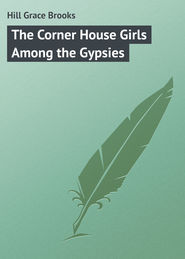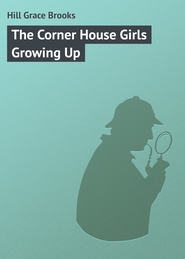По всем вопросам обращайтесь на: info@litportal.ru
(©) 2003-2024.
✖
The Corner House Girls in a Play
Настройки чтения
Размер шрифта
Высота строк
Поля
"Why – I dunno," said the puzzled farmer. "It re'lly is too bad he l'arned about you gals playin' that prank, ain't it?"
Agnes stared at him. She could not understand this at all. And immediately Mr. Buckham went on to say: "The Women's and Children's Hospital, eh? That's where your friend, Mrs. Eland, is matron, isn't it?"
"She is Tess' and Dot's friend," explained Agnes.
"Wal! I come inter town pertic'lar to-day to see her. I got kind of a funny letter from her this week."
"From Mrs. Eland?"
"Yep. Marm said I'd better answer it in person. Word o' mouth ain't so ha'sh as a letter, ye know. And I ain't no writer myself."
Had he said this to Ruth, for instance, she would doubtless have been interested enough to have asked some questions, and so discovered what trouble Dot's busy tongue had started. Agnes, however, only listened perfunctorily to the farmer's speech. Her mind was too perplexed about the letter which had reached Mr. Marks purporting to come from Mr. Buckham, in which he had complained of the girls stealing his berries. Mr. Buckham spoke as though he had no knowledge of the information lodged with the principal of the high school.
Now Tess and Dot saw "the eagle man" and they came clamoring about him. Ruth came, too; and Neale followed. The boy had had no opportunity of talking to the farmer alone the day of the chestnutting party. Now he invited Mr. Buckham to go home with him to Mr. Con Murphy's for dinner, and the old farmer accepted.
"That pretty, leetle gal's mighty bothered about her and her friends playin' hob in my berry patch last May," Mr. Bob Buckham said, as he and Neale crossed the Parade Ground. "How'd that school teacher l'arn of it? Too bad! I reckon the gals didn't mean no harm."
"Why," cried Neale, flushing, and looking at the old man curiously. "Somebody told on them."
"Told the teacher, you mean?"
"Yes. Wrote a letter to Mr. Marks giving all their names."
"Sho! ain't that a shame?" said Mr. Buckham, calm as a summer sea.
"Pretty mean I think myself, sir," Neale said warmly. "It stirred Mr. Marks all up. He says he thinks you may intend making the girls pay for the berries they took."
"What's that?" demanded the farmer, stopping stock still on the walk.
"He says your letter sounds as though you would do just that."
"My letter?"
"Mr. Marks says the letter came from you."
"Why, Neale, you know I ain't no writest," gasped the farmer. "It ain't possible he thinks I'd write him about a peck or two of strawberries? They was some of my best and earliest ones, and I was mad enough about it at the time; but, shucks! old Bob Buckham ain't mean enough to harry a pack of gals about sech a thing, I should hope!"
Neale stared at him with a look of satisfaction on his face.
"Don't mean to tell me that Pretty thinks that of me, do ye?" added the old gentleman, much worried.
"Yes, sir. She thinks you sent the letter."
"Wal! she treats me mighty nice, then. I'd des-arve snubbin' – I most surely would – at her han's if she thinks I am that mean. She's a mighty nice gal."
"She's the best little sport ever, Aggie is!" declared the boy, enthusiastically. Then he added: "I knew it wasn't like you to do such a thing, and it's puzzled me. But somebody wrote in your name and listed all the girls that raided your berry patch —but one."
"All but one gal?"
"Yes, sir. One girl's name was left off the list," Neale said confidently.
"Oh, dear me! Dear, dear me!" murmured the old farmer, pursing his lips and eyeing Neale very gravely.
"And that particular girl is going to have one of the best parts in the show they are giving for the hospital benefit," Neale pursued.
"You don't say so?" said old Bob Buckham, still seriously.
"And that very part is just what would be given our Aggie if she were not in disgrace – yes, sir!"
"Not little Pretty?" demanded the farmer.
"Yes, sir."
"My! my!"
"This one girl whose name did not reach Mr. Marks was just as guilty as the others. That's right, Mr. Buckham. And she's got out of it – "
"Hi!" exclaimed the farmer, sharply. "You're accusin' her of makin' all the trouble for her mates."
"If you didn't, Mr. Buckham," said Neale, boldly.
"I most sartainly didn't!" exclaimed Mr. Buckham. "You know I wouldn't, Neale O'Neil; don't you?"
"I never did think you did so mean a thing," declared Neale, frankly.
"But somebody told your teacher."
"Wrote him."
"And he thinks I done it?"
"Whoever it was must have signed your name to the letter."
"Nobody but marm does that," said the old man, quickly. "'Strawberry Farm' – that is what we call the place, you know, Neale."
"Yes, sir."
"An' I got it printed on some letter paper, and marm always writes my letters for me on that paper. Then, if it's a very pertic'lar one, I sign it myself. But you know, Neale, I ain't no schollard. I handle a muck-fork better'n I do a pen."
"I know – yes, sir," agreed the boy.
"Now," continued the farmer, vigorously, "you find out if this here letter that was writ, and your teacher received, was writ on one of our letterheads. Of course, marm never done it; but – p'raps – Wal! you find out if it re'lly did come from Strawberry Farm, and if Bob Buckham's name is onto it. That's all."
And Mr. Buckham refused to discuss the matter any further at that time.
The busy fall days were flying. It was already the middle of October. Hallowe'en was in prospect and Carrie Poole, who lived in a modernized farmhouse out of town on the Buckshot Road, planned to give a big Hallowe'en party. Of course the two Corner House girls and Neale O'Neil were invited.
Looking forward to the party divided interest among the older girls with the preparations for the performance of The Carnation Countess.










